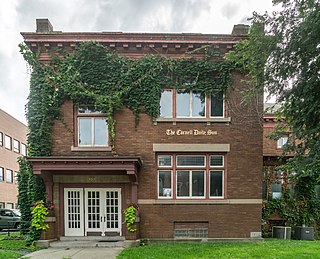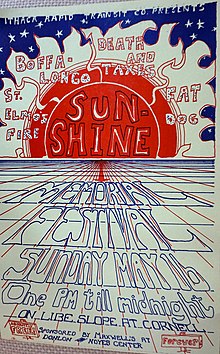
The Hartung–Boothroyd Observatory (HBO) is located atop Mount Pleasant near the Cornell University in Ithaca, New York (US). It is used mainly as a teaching facility for upper-level undergraduate astronomy classes. The observatory is named to recognize funding from M. John Hartung, a 1908 Cornell graduate and later chemical industrialist, and to honor Samuel L. Boothroyd, the founder of Cornell's Department of Astronomy. The facility was designed and directed from 1974 to 2012 by James R. Houck.
The Hangovers are a men's collegiate a cappella ensemble based at Cornell University. Founded in 1968, they are the oldest active a cappella group on campus and are the official a cappella subset of the Cornell University Glee Club, itself the oldest student organization of any kind at Cornell University. The Hangovers' repertoire consists mainly of popular songs arranged for the ensemble by its members and alumni, but the group also performs traditional Cornell songs, as well as selections from the Glee Club repertoire on occasion.

The Cornell Review is an independent newspaper published by students of Cornell University in Ithaca, New York. With the motto, "We Do Not Apologize," the Review has a history in conservative journalism and was once one of the leading college conservative publications in the United States. While the ideological makeup of its staff shifts over the years, the paper has consistently accused Cornell of adhering to left-wing politics and political correctness, delivered with a signature anti-establishment tone.

Dragon Day is an annual event that occurs the Friday before spring break at Cornell University. The center of the event is the procession of a dragon, created by first-year architecture students at the Cornell University College of Architecture, Art, and Planning. The construction is funded by selling Dragon Day t-shirts. Unfortunately, Dragon Day has lost popularity in past years due to the day being on the Friday before spring break

The Cornell Daily Sun is an independent newspaper at Cornell University in Ithaca, New York. It is published twice weekly by Cornell University students and hired employees. Founded in 1880, The Sun is the oldest continuously independent college daily in the United States.
Cornelliana is anything related to Cornell University, an Ivy League university founded in 1865 in Ithaca, New York. The university has a considerable number of traditions, legends, and lore unique to the university that have developed over its existence, which spans over 150 years.

Balch Hall is the only remaining all-female residence hall on the North Campus of Cornell University. Originally, Balch Hall consisted of four eighty-student halls, hence the more former name the Balch Halls, which has fallen out of use. Balch Hall is open only to female freshman and is divided into sections, known as units, each with a Residential Advisor who helps the new students acclimate themselves with the campus. Prior to the 2021-2024 renovations, the building was known for its old fashioned design as each room has a personal sink, or shares a sink with one other room.

David F. Hoy Field, usually referred to simply as Hoy Field, was a baseball field at Cornell University in Ithaca, New York. It was home to the Big Red baseball team from 1922 to 2022, when the team moved to a newly constructed facility east of campus, Booth Field. The former Hoy Field was demolished in 2023 to make way for a new building for the Ann S. Bowers College of Computing and Information Science.

The Cornell Botanic Gardens is a botanical garden located adjacent to the Cornell University campus in Ithaca, New York. The Botanic Gardens proper consist of 25 acres (10 ha) of botanical gardens and 150 acres (61 ha) of the F. R. Newman Arboretum. The greater Botanic Gardens includes 40 different nature areas around Cornell and Ithaca, covering 4,300 acres (1,700 ha).

Gimme! Coffee is a coffee roaster and third-wave coffee shop, based in New York, US, with espresso bars in Ithaca and Trumansburg. In response to the COVID-19 pandemic, Gimme! in 2020 closed the Manhattan and Brooklyn-based locations, and began an Ithaca-area delivery service. Gimme! Coffee also has a wholesale service that caters to coffee and espresso establishments. In January 2020, Colleen Anunu replaced founder Kevin Cuddeback as CEO after he had served 20 years in the role; Anunu then made the company into a worker-owned cooperative, which it remains in July 25, 2022. Gimme says that it forms relationships with farmers who grow coffee; farmers may receive a price premium which can help them improve their operations.
Revision week is a period in the UK and other Commonwealth countries preceding examinations in high schools, higher education institutions, and military colleges. In American colleges, this period is known as a Reading Period. Generally, this period is one week long and free of classes or assessment, permitting students to spend the period revising material, generally in preparation for final exams. With the exception of Canadian post-secondary institutions, is not often allocated for mid-semester or ongoing assessment. Each day of such a period may be referred to as a reading day. Hell week is used in many similar educational contexts, such as police or military training.

North Campus is a mostly residential section of Cornell University's main campus in Ithaca, New York. It includes the neighborhoods located north of Fall Creek. All freshmen are housed on North Campus as part of Cornell's common first-year experience and residential initiatives.

Barton Hall is an on-campus field house on the campus of Cornell University in Ithaca, New York. It is the site of the school's indoor track facilities, ROTC offices and classes, and Cornell Police. For a long time, Barton Hall was the largest unpillared room in existence. The interior of the building covers almost 2 acres (8,100 m2), and includes a 1/8 mile (200m) indoor track.

Willard Straight Hall is the student union building on the central campus of Cornell University in Ithaca, New York. It is located on Campus Road, adjacent to the Ho Plaza and Cornell Health.

Cornell University is a private Ivy League land-grant research university based in Ithaca, New York. The university was founded in 1865 by Ezra Cornell and Andrew Dickson White. Since its founding, Cornell has been a co-educational and nonsectarian institution. As of fall 2023, the student body included over 16,000 undergraduate and 10,000 graduate students from all 50 U.S. states and 130 countries.

Justin Morrill Hall, known almost exclusively as Morrill Hall, is an academic building of Cornell University on its main campus in Ithaca, New York. As of 2009, it houses the university's Departments of Romance Studies, Russian Literature, and Linguistics. The building is named in honor of Justin Smith Morrill, who as Senator from Vermont was the primary proponent of the Morrill Land-Grant Colleges Act of 1862 which greatly assisted the founding of Cornell University. Morrill Hall was declared a National Historic Landmark in 1965.

The Sphinx Head Society is the oldest senior honor society at Cornell University. Sphinx Head recognizes Cornell senior men and women who have demonstrated respectable strength of character on top of a dedication to leadership and service at Cornell University. In 1929 The New York Times held that election into Sphinx Head and similar societies constituted "the highest non-scholastic honor within reach of undergraduates."

Aleph Samach (אס) was a junior honor society at Cornell University that existed from 1893 until 1981. It was founded on four pillars: leadership, loyalty, service, and honor. Unlike most collegiate secret societies, which have primarily senior membership, Aleph Samach was composed mostly of juniors. While senior members played an advisory role within the society, Aleph Samach's primary goal was "to promote the greater good of the Cornell community by connecting junior leaders, cultivating their leadership skills, and developing their commitment to campus service."

Martha Elizabeth Pollack is an American computer scientist who has served as the 14th president of Cornell University since April 2017. Previously, she served as the 14th provost and executive vice president for academic affairs of the University of Michigan from 2013 to 2017.























